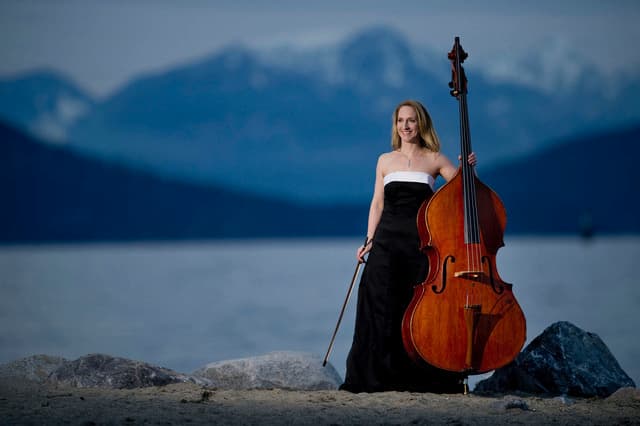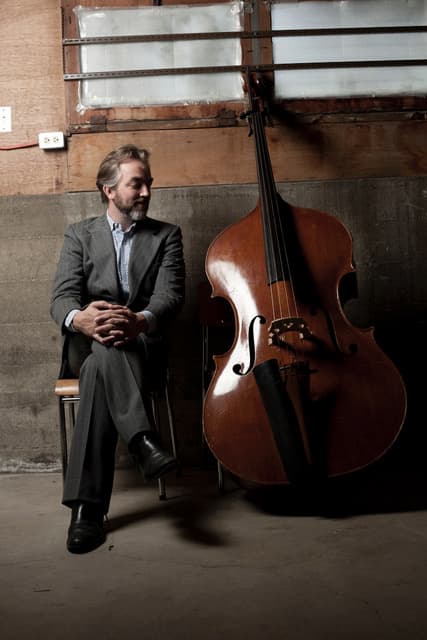Meaghan Williams, an accomplished double bass musician based in Vancouver, is the soloist on the recent LP release Placentia Bay: Summer of 1941. The LP is named after the double-bass concerto written by Canadian composer and bassist Mark Haney. This work is inspired by the meeting between U.S. President Franklin D. Roosevelt and British Prime Minister Winston Churchill at Placentia Bay, Newfoundland. Growing up in Newfoundland, Meaghan has a personal connection to the work, which she will share with us in this interview.
Hi Meaghan, can you tell us a little about yourself? What made you become a bassist?

Meaghan Williams in Vancouver, Feb. 2019 © Jennifer Gauthier Photo
Like many musicians, I started on the instrument that was available to me at the time – in my case, the piano. I was fortunate to go to a school that had a strong string program and was introduced to the violin a little later on. Then, one summer, I attended a music festival and heard a bass for the first time and from that point forward, the bass was my focus. There is something extremely attractive to me about the sound of the instrument and the low register; you really feel like you are part of a wall of sound when you get to play in a bass section in an orchestra. Also, bass players are a lot of fun to be around, and I love being part of a team working together to achieve a cohesive sound as a section.
Growing up in Newfoundland, what was your first impression knowing Haney was writing a composition based on the event?
Growing up in Newfoundland you are surrounded by, first and foremost, a magnificent landscape, a place steeped in history, and a sense of importance of place. The island of Newfoundland is in the middle of the North Atlantic Ocean, well east of the rest of Canada. Newfoundland is closer to Europe than to Western Canada. This location of strategic importance is one of the reasons the meeting between Churchill and Roosevelt took place there. It is also worth mentioning that Newfoundland was not ever part of Canada until 1949 – which many Newfoundlanders will tell you all about if given the opportunity. It is an incredibly beautiful place. Mark had been ruminating about a work connected to this place, and when we had our earliest discussions about the possibility of a bass concerto, he had plans to go and spend time there. When he did, the concerto really started to take shape. Being in Placentia Bay and connecting with the people there and the landscape was an important part of his creative process, and I think that comes across in the concerto.
Mark Haney is also a bassist. What did you like about this concerto? I truly love this work. I haven’t listened to many concertos for double bass. Are there many concertos written for double bass?
I love working with living composers because we get to work collaboratively to explore what kinds of sounds are possible on the double bass, and to really understand exactly how to deliver the sound that the composer has envisioned. In the classical context, historically, the bass has been an instrument used in chamber ensembles and in orchestras. Composers are beginning to discover the bass as a solo instrument, and working with a bass player and composer like Mark Haney is wonderful because there is so much about the idiosyncrasies of the instrument that you don’t need to explain. Mark was sensitive to the inherent challenges of the double bass, like getting the solo voice to project over the sounds of the orchestra, and he wrote the concerto with that in mind, in this case, by eliminating the use of the bass section in the orchestra. There are a million reasons I am grateful to Mark for the thought, creativity, and sensitivity he brought to this project.
There are a number of standard concerti written for the double bass, but we don’t get the opportunity to perform as soloists as often as pianists or violinists. Prominent double bass soloists like Gary Karr and Joel Quarrington have worked tirelessly to bring a previously unheard-of level of technical proficiency and artistry to the stage as double bass soloists. Hopefully, the creation of a new work like Placentia Bay: Summer of 1941 will help to shine a spotlight on the instrument and encourage more composers to write for the bass, and more orchestras to program works featuring the double bass.
The concerto unfolds in three movements, and it involves a double bass, orchestra, and also a chorus.
This is one of the elements of the concerto that actually evolved from the premiere to the recording. Each movement of the concerto is based on a hymn that was sung on board the HMS Prince of Wales at the secret meeting between Churchill and Roosevelt in 1941 off the shores of Placentia Bay. The first movement is based on the hymn Eternal Father Strong to Save and also quotes the Ode to Newfoundland, the provincial anthem. The third movement is based on the hymn Onward, Christian Soldiers. Initially, the second movement of the concerto had only a solo soprano voice singing one line from the hymn, O God, Our Help in Ages Past, and by the time we got to the recording stage, Mark’s concept for the hymn was slightly different, and we engaged the singers from musica intima, an internationally acclaimed collaborative vocal ensemble based in Vancouver to sing the choral parts.

Mark Haney © Angela Fama
Are there any live performances of the work?
The concerto was premiered by the Okanagan Symphony Orchestra in November 2019 under the direction of Rosemary Thomson. This was pre-pandemic, and it seems like a lifetime ago. Nevertheless, the themes woven throughout the concerto are more relevant than ever given the ongoing conflicts in many parts of the world.
How was the recording process? Did it take a long time to record?
The entire concerto was recorded over 5 days in early April 2022 at Afterlife Studio (formerly Mushroom Studios) with sounds engineer John Raham. Mark had some very specific ideas about the kinds of textures and sounds he was looking for and John helped to achieve that in the recorded version.
When you played it again for recording in 2022 (after the pandemic), did you think of the work from a different perspective?
I think the fundamental tensions about war and conflict that Mark was grappling with when he was writing the concerto unfortunately persist despite our current circumstances being quite different. The vocal line from the second movement sticks with me about “time like an ever rolling stream” which will carry us all away. I think we are more acutely aware of this now than we have ever been, certainly in my lifetime. We only get one shot at this thing called life, and it is up to each one of us to ensure that our impact is positive.
Would you like to share your upcoming projects or performances with us?
I’m really excited about the upcoming premieres of three new commissions written for the Kitchen Sink Pocket Orchestra (kitchensinkpocketorchestra.ca). I’ve got performances with Allegra Chamber Orchestra (allegrachamberorchestra.com) and Vetta Chamber Music (vettamusic.com) booked this season. I’m looking forward to playing Flight by Jonathon Dove with Vancouver Opera (vancouveropera.ca) as part of the company’s 65th anniversary season and to working with several talented guest conductors and the Okanagan Symphony Orchestra (okanagansymphony.com) as the orchestra embarks on a search for a new Music Director.
Learn more about Meaghan Williams and her performances.
The LP Placentia Bay: Summer of 1941 is available on all streaming platforms and is available to purchase on
For more of the best in classical music, sign up for our E-Newsletter




